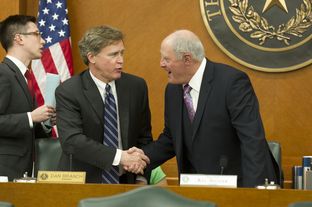A Feint Disguised as a Special Committee on Higher Ed

For higher education followers, one of the great lingering mysteries of the 83rd session is the fate of a special committee that was formed to look into governance issues at the University of Texas System.
Shortly after midnight on February 19, Lt. Gov. David Dewhurst, who earlier that day had given a teary defense of University of Texas at Austin President Bill Powers on the Senate floor, sent a scathing text to UT System Regent Alex Cranberg.
“You have disappointed me,” he wrote, under the impression, which he later walked back, that regents had been spreading anonymous rumors about Powers. “I tried to help you. Based on what I heard this evening, you and [fellow regent Wallace Hall] are about to have the wood applied to you.”
The following day, Dewhurst and Speaker Joe Straus, R-San Antonio, renewed the Joint Oversight Committee on Higher Education Governance, Excellence and Transparency — the presumed venue for that spanking.
Originally created in 2011 amid similar controversy, the latest iteration of the joint oversight committee is co-chaired by state Rep. Dan Branch, R-Dallas, and state Sen. Kel Seliger, R-Amarillo, and was designed specifically with a UT System focus.
In a statement issued a week later, Dewhurst said the committee was formed “so that all sides have a forum to calmly and respectfully lay out the facts.” But it never happened. Instead, the oversight committee became the Sasquatch of the session, with rumors of impending sightings that never materialized.
The committee held only a single meeting during the regular session, and it was solely for organizational purposes. For those in attendance, it hinted a high potential for drama to come.
Lawmakers indicated a willingness to subpoena the UT regents if necessary. The co-chairmen announced a massive open records request they had filed with the system. And most famously, state Rep. Jim Pitts, R-Waxahachie, accused the board of being on a “witch hunt” targeting Powers.
“I hope we’ll be able to end these witch hunts,” he said.
And that was the last the committee was heard from.
“I’ve got a problem with beating dead horses,” Seliger said this week. “With no legislation directly related to the program of work for the oversight committee, I didn’t want to waste anybody’s time.”
He noted that “an awful lot” of the issues the joint committee was interested in were addressed “in one form or another” in the Senate Nominations Committee and the House Select Committee on Transparency in State Agency Operations, both of which held hearings in which at least one UT regent was publicly grilled, as well as in private meetings with regents.
But there’s a faint glimmer of a chance it could come back.
“Chairman Branch and I are going to discuss it,” Seliger said this week. “There are still some issues we could talk about, maybe. We’ll see where that goes.”
Seliger said those remaining topics mostly deal with reviewing what the committee has learned about proper higher education governance and examining “where there might have been deviations from those best practices.”
But even with the regular session over, it’s not likely to be easy to get the band back together. After all, Seliger’s schedule — for one — is quickly filling up with hearing dates around the state for his other job: chairing the Senate Redistricting Committee.

